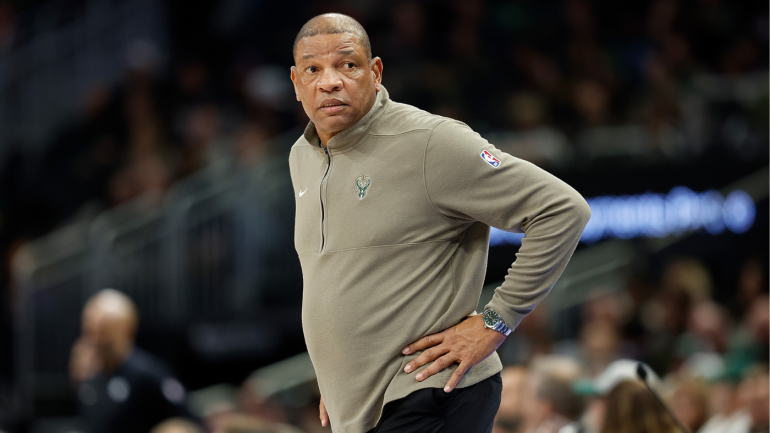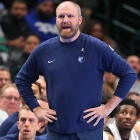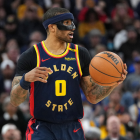
A markedly improved defense. A less explosive offense. A record of mediocrity hiding a recent, and impressive, post-All Star Game surge. And a nagging sense that the Doc Rivers era in Milwaukee has not yet been the raging success the Bucks surely hoped for when they installed him midseason.
That's the perplexing takeaway after Rivers' first 25 games as the Bucks' head coach.
That 25-game mark, which came Sunday in an impressive 118-92 win over the Oklahoma City Thunder, is an important one for NBA teams as they evaluate exactly what they have and who they are. Front offices and coaching staffs look to the first 20 to 25 games of a season to get a real sense of their team.
A similar assessment of the Rivers-led Bucks simply happened unusually late in the season, compliments of the Bucks' decision in January to fire Adrian Griffin despite his 30-13 record. It was not a universally beloved decision, and I certainly thought it was a gigantic error in judgment.
Yet the results so far are mixed, and the picture is, as it tends to be with Rivers at the helm of any would-be contender, very, very open to interpretation.
Let's start with Rivers' entire time in charge of this team, going back to Jan. 29, and compare it with Griffin's entire, albeit longer, stretch.
Win-loss records:
- Doc's Bucks: 14-11
- Griffin's Bucks: 30-13
That is obviously a win for the Griffin defenders, or at least the Doc doubters. But things get more interesting beyond the win-loss records.
Offensive rating:
- Doc's Bucks: 12th
- Griffin's Bucks: 2nd
Defensive rating:
- Doc's Bucks: 14th
- Griffin's Bucks: 21st
Net rating:
- Doc's Bucks: 11th
- Griffin's Bucks: 10th
Basically, the tenures of Rivers (so far) and Griffin netted similar overall outcomes through vastly different styles. Doc's team has improved markedly on defense but fallen back on offense compared to his predecessors, but both have similar outcomes in point differential per 100 possessions.
There are caveats here. Rivers' tenure has seen Khris Middleton, who recently returned from injury, play in only seven of his 25 games with Doc as head coach. But a less favorable view of Rivers would point out that Giannis Antetokounmpo and Damian Lillard were afforded 43 games together before Doc's arrival, offering Rivers, in theory, a more in-sync version of the two co-stars than Griffin got.
Time, we know, and often a lot of it, is critical to big-name stars learning to play together. Ask the Big Three Miami Heat team. Ask Kevin Durant about his time in Brooklyn or, now, in Phoenix. Ask Kyrie Irving and Luka Doncic, who have only just this year seemed to click, and still not enough to make the Mavs real contenders.
Things get murkier the more you dive into, and narrow down, some of the numbers.
Since the All-Star Game, Rivers' Bucks team has been outstanding. That 15-game stretch has netted an 11-4 record, a much better offense (4th in offensive rating over that time) and almost twice the point differential per 100 possessions (good for the 6th-best net rating over that time).
It would be fair to say, then, that Rivers, after getting 10 games under his belt to size up his team and work his coaching magic, has the Bucks rolling.
Here's the catch.
Griffin was even better over the same stretch -- games 11 to 25 -- under his watch.
And if it's fair to point to Rivers' post-All Star Game run, and write off those first 10 games as a required learning curve, the same turnabout would be fair play for Griffin.
After getting his 10 games out of the way earlier this season, Griffin's Bucks went 12-3 over their next 15. The Bucks offense over that stretch was the best in the NBA. Interestingly, the defense jumped to 12th for that run -- better than that of the Rivers-coached defense so far. And Milwaukee had the second-best net rating during that 15-game run, a sign, perhaps, that Griffin, like Doc now, had figured some things out.
Yes, those schedules are different. Yes, Middleton's absence matters. And yes, it's hard to draw stark conclusions from any data points over any stretch of time. As Mark Twain said: "There are three kinds of lies: lies, damned lies, and statistics."
But it's also true that, whatever the numbers, Griffin was 30-13 when he was fired, and Rivers is just 14-11 now. That is not exactly a riveting argument that the Bucks did the right thing when they brought in a guy who hasn't been to an NBA Finals in 14 years.
And who's to say, over the rest of his tenure, that Rivers won't again lose the thread of this Bucks team, just as Griffin seemed to before being unceremoniously replaced.
That's the thing about Doc, his teams, and the very-real dance of trying to balance over the years their legitimate title chances with what has, since Boston, been brutal disappointment: You can often see what you want to see in him, and his teams.
Rivers might be the NBA's truest Rorschach test -- a collection of data, successes, disappointments and still-lingering promises that look exactly the way you want them to look.
You may see a surging Doc Rivers team, impressively improved since the All-Star Break, reinforced by Middleton's return, primed to make the run we all thought possible when Dame first arrived in Wisconsin.
But I see the same old story: Rivers, at the helm of a team that's not that much better than it was without him, Lillard and Giannis still clearly ill at ease on the floor together, all of it trending toward another postseason letdown.
Because a deep dive on Rivers' tenure in Milwaukee may show signs of promise. But Adrian Griffin had similar signs and he, at least, didn't come with a track record as one of the sport's most disappointing postseason head coaches the NBA has produced.
![[object Object] Logo](https://sportshub.cbsistatic.com/i/2020/04/22/e9ceb731-8b3f-4c60-98fe-090ab66a2997/screen-shot-2020-04-22-at-11-04-56-am.png)



















